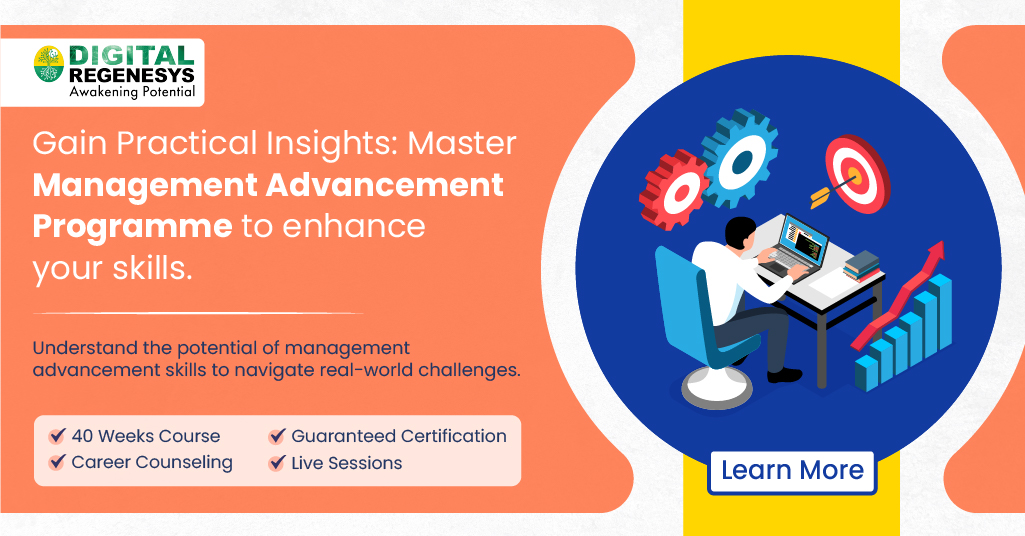How to Apply Management Advancement Skills in Real-world Scenarios?

Nowadays, the business environment is so dynamic that possessing management advancement skills is crucial for professionals to complete their duties efficiently and thrive in the workplace. While theoretical knowledge is essential, the ability to apply these skills effectively in real-world scenarios sets you apart. That is why it is necessary for you to enrol in management advancement programmes (MAP) to improve your practical skills and knowledge in management, enhancing your personal abilities and professional path.
Management advancement courses help you better understand your organisation’s culture, goals, and values. They will also equip you with skills to manage your team and fulfil your responsibilities, allowing you to bring immense success to your company. Besides, you can acquire competencies like communication, decision-making, strategic planning, and more for effective management and leadership.
So, in this article, let’s explore how you can apply management advancement skills in real-world scenarios.
Reinforcing Decision-Making
Skilled leaders make sound judgments and act decisively when navigating complex decisions. They draw on models like SWOT (strengths, weaknesses, opportunities, and threats) analysis and cost-benefit analysis, which help them weigh options, assess risks, and anticipate outcomes. For example, when building strategic plans or resource allocation, you can prioritise data insights, stakeholder feedback, and organisational goals to inform your decisions.
Moreover, with the help of management advancement courses, you can learn and follow the three C’s of management for a successful decision-making process. The three C’s are constructive conflict, consideration and closure. Let’s take a closer look into these three components:
- Constructive conflict: This involves actively engaging team members in the decision-making process. It encourages diverse viewpoints and discussions, which can spark creative problem-solving.
- Consideration: All stakeholders involved should feel their perspectives were reasonably taken into account before a solution is reached. Without this sense of acknowledgement, they may be less likely to commit to and implement the solution thoroughly.
- Closure: This step ensures stakeholders are aligned before moving forward. It requires defining what constitutes a successful completion of a project or initiative within a set timeframe, determining if any tasks remain unfinished, and ensuring everyone agrees on whether the outcome was a success.
Encouraging Team Building
High-performing teams form the foundation for organisational success. Skilled managers are pivotal in fostering a positive team culture and boosting employee engagement. You can cultivate a sense of belonging and shared purpose within your teams by organising team-building activities, recognising achievements, and providing growth opportunities.
Moreover, whether leading a small task force or overseeing a large department, you must align individual strengths with organisational goals, inspire collaboration, and nurture a supportive work environment that encourages innovation and success.
Additionally, through MAP, you can learn techniques to develop stronger connections with your coworkers by chatting about non-work topics before meetings and learning more about their lives outside the office. You should also encourage open discussions about personal and professional differences and be receptive to diverse perspectives during conversations.
Employing Effective Conflict Resolution
Conflicts happen in almost every workplace, but skilled managers see them as opportunities to grow and work together. Management certificate programmes help you learn the importance of mediation, negotiation, and conflict resolution methods. By employing these methods, you can get people talking openly and find solutions that work for everyone.
For example, imagine a cross-functional team dealing with conflicts. In this scenario, effective conflict resolution means recognising different viewpoints, finding compromises, and encouraging respect and understanding. Following this approach will not only resolve issues within your company but also enhance productivity and efficiency in your organisation.
Mastering Efficient Communication
Clear communication is key to effective leadership. Beyond just sharing information, skilled communicators use active listening, empathy, and body language to build understanding and rapport. Therefore, you must leverage various communication channels, from in-person meetings to digital tools, to share updates, provide feedback, and address issues. For example, performance reviews require compassionate communication to give constructive feedback and support growth.
Moreover, when you are in a managerial role, you must tackle complex business situations and ensure your team has all the information to succeed. Therefore, during your MAP training, you can learn communication techniques and tools that enable you to continually update your team, ensuring they better understand how their work factors align with the corporate objectives. As a result, you can be transparent about the tasks and instil your team with a shared vision of the company goals and objectives.
Understanding Leadership Approaches
Effective leadership requires a flexible approach. Different situations call for different leadership styles, like authoritative, democratic, transformational, or hands-off. Let’s take a close look into each of these leadership styles:
-
Authoritative Leadership:
Authoritative leadership involves a capable leader swiftly taking charge during a crisis. The leader gives clear directions on addressing the problem and assigns tasks effectively, ensuring the team stays on track to resolve the issue efficiently.
-
Democratic Leadership:
Democratic leadership encourages everyone to share their ideas, especially in a brainstorming session for a new product. They make sure everyone participates and considers different viewpoints before deciding. By letting team members contribute, the leader creates a sense of ownership.
-
Transformational Leadership:
A transformational leader motivates their team to reach challenging targets and exceed anticipations. Through guidance, support, and personalised assistance, the leader empowers individuals to unlock their full abilities and drive organisational evolution.
-
Hands-Off Leadership:
In this approach, the leader trusts their team’s expertise and decision-making, providing resources and support as required, but avoids micromanaging. This style promotes a culture of innovation, independence, and personal accountability, empowering team members to thrive and excel creatively.
With proper guidance and knowledge from MAP training, you can assess your organisation, team, and specific needs to determine the best approach.
Conclusion
Mastering leadership skills is a hands-on journey of constant learning and implementation. Therefore, through management advancement courses, you must understand different management styles, improve communication skills, learn techniques to resolve conflicts and make smart decisions. Besides, you must practice methods to manage time well, foster teamwork, and be adaptable to excel in today’s complex business world.
However, make sure to dedicate your time to practice and focus on professional growth. As a result, you can achieve your full potential and steer your organisation towards lasting success through MAP training.
Are you looking for a suitable course in management advancement? Digital Regenesys’s Management Advancement Programme offers a well-structured curriculum that equips you with the skills and knowledge to advance your career in this field. To learn more, visit our website now!
FAQs – Frequently Asked Questions: How to Apply Management Advancement Skills in Real-world Scenarios?
Q1) What is the management Advancement Programme?
A management advancement programme is a well-structured educational programme designed to help individuals acquire management skills and knowledge. This programme also equips the learners with the tools and techniques required to excel in leadership roles.
Q2) How can a Management Advancement Programme help me in my career?
Management advancement programmes include helping you build key management skills like decision-making, communication, conflict resolution, teamwork, and leadership. Developing these abilities can make you a more effective manager, improve your team’s performance, and boost your career opportunities.
Q3) Are Management Advancement Programmes available online?
Yes, plenty of management advancement programmes are available online these days. These online offerings provide a flexible and convenient option for busy professionals and graduates. At Digital Regenesys, you will get access to interactive exercises and experienced instructors, allowing you to advance your management skills to excel in your career.
Q4) Can I pursue a Management Advancement Programme while working full-time?
Yes, you can pursue Management Advancement Programmes while working full-time. Today, most programmes are designed for working professionals. You can find online courses from platforms like Digital Regenesys that let you balance your studies with a full-time job.
Q5)What topics are covered in a typical Management Advancement Programme?
A typical Management Advancement Programme covers a variety of topics related to management and leadership. These include decision-making, communication, conflict resolution, team dynamics, strategic planning, organisational behaviour, and change management.
Last Updated: 14 August 2024
